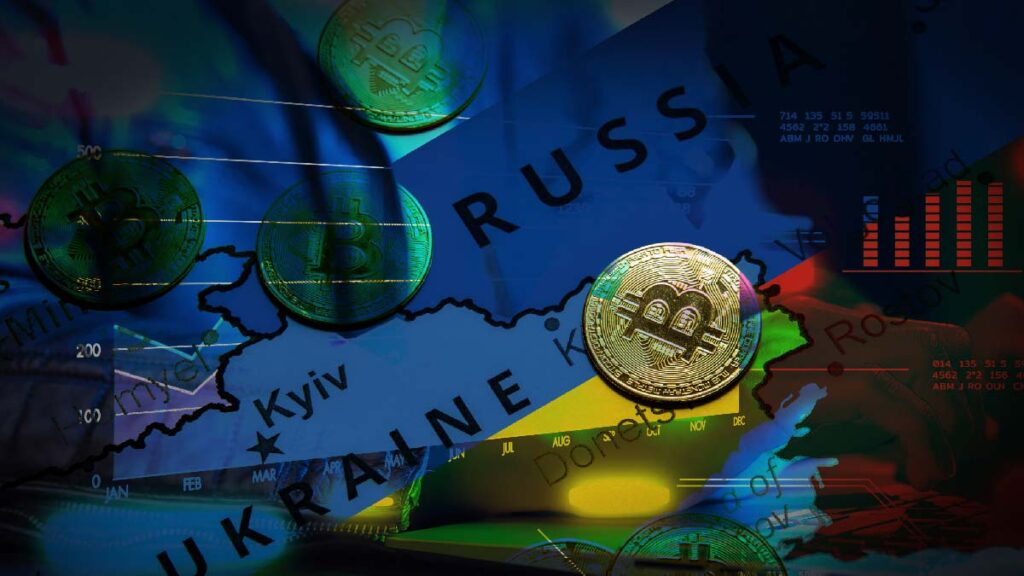
In our interconnected and globalized world, war is one thing that carries rippling effects that can spread far and wide. On the other side of the coin, a globalized economy means that chain reactions can reverberate across the entire globe and throw entire economies off balance. The Russian Ukrainian war and the crypto market are deeply related in that sense.
Wars are as many economic conflicts as they are physical, and the Russian Ukrainian war is the first modern conflict in which cryptocurrencies have played an inherent part – to a degree.
The technology that cryptocurrencies are built on, blockchain, bears characteristics that make them particularly useful in, let’s say, economically tight spots. Though not a be all end all solution by any stretch, cryptocurrencies can be used as an effective loophole to ease economic burdens during armed conflicts.
Is the Ukraine Russian war the first crypto war?
Though that may sound like a buzzword thrown around in the media for clicks, it is not so far from reality. Often the second most important weapon in any conflict besides bullets is money. Without the fuel to carry on fighting, there is only so much that raw manpower and bombs can achieve.
The Ukrainian government issued war bonds to help fund their country’s defense as the Russian siege tightened its grip and traditional financial transactions became harder to perform. The invaded country was in an economic pickle.
In response, tens of millions of dollars worth of crypto donations have flooded into the besieged country from around the world. These are funds that the Russian invaders cannot steal since they do not go through banks, which can be taken and controlled by Russians as the invasion pushes deeper. This makes this method of wealth transaction inherently valuable due to its secure and immutable nature.
Can we say that cryptocurrency helping Ukraine? Indeed, it is, Ukrainian citizens, unable to use credit cards and with little access to cash, find themselves benefiting from the crypto donations as well for its ability to bypass traditional financial infrastructure.
Though a lack of internet services complicates the process, once again, tech giants step onto the geopolitical stage as Elon Musk activates his Star Link to provide internet to Ukraine.
Though not integral to the war effort, both sides of the Russian Ukrainian war and the crypto market have a vested interest in global economic continuity.
Crypto as a Tool Against U.S. Sanctions
Meanwhile, Russia has been attempting to use cryptocurrencies to circumvent brutal economic sanctions against their own nation. According to CryptoCompare, the number of transfers from the Russian ruble to bitcoin and Tether, a stable coin pegged to the U.S. dollar, has increased since Russia’s invasion of Ukraine.
According to one U.S. government official, however, utilizing Bitcoin as a means to escape sanctions is doubtful.
“The scale that the Russian state would need to successfully circumvent all U.S. and partners’ financial sanctions would almost certainly render cryptocurrency as an ineffective primary tool for the state,” said Carol House, director of cybersecurity for the National Security Council, during a webinar according to Reuters.
While the technology is politically neutral and can be used for both sides’ benefit, the sheer amount of liquidity needed to properly make a dent against sanctions and prop up the Russian economy simply does not seem able to deliver.
Also, the prices of crypto often move in tandem with that of the stock market, which also took a nosedive in recent weeks.
Furthermore, Bitcoin, which is the token that Russians have considered as a method to avoid sanctions, is built on blockchain technology. What this means is that it is traceable, transparent, and trackable, a major facet of its security and usability. This makes it less than ideal as a tool to evade sanctions.
Does war affect crypto prices?
Absolutely, and it already has. Although it would be a stretch to blame the most recent crypto market crash solely on the Russian Ukrainian war, it is undoubtedly one of the many intertwining dominos along the line that led to it. Many critics would say that it is a small factor compared to, say, the U.S. Federal Tax rate increase, and even that was not the main factor by some interpretations. But that is a debate for another day.
The Russian invasion of Ukraine has had far-reaching effects, as is the case in a globalized economy. It often is not one single trigger that culminates in crisis or collapse but a series of factors that gather into the perfect storm that incrementally adds to the volatility of an already shaky market, eventually toppling giants.
Summary
The technology underpinning cryptocurrencies, blockchain, is certainly a novel and effective alternative method of financial operations. Its potential has not gone untapped during the Russian invasion of Ukraine and its rippling effects. The extent of its impact is debatable, and its future potential is still under the spotlight, but few can deny its utility in both times of crisis and peace.